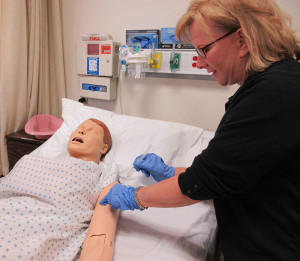
The Associate Degree Nursing Program at Delta College isn’t for the faint of heart, nor the weak of will.

The first hurdle for a hopeful nurse is to complete the prerequisite courses in anatomy, physiology, microbiology, nutrition, algebra, and reading and composition.
“It took me about 1 ½ years to do the science, because I did them one at a time so I could really focus on one. Altogether, it took me 2 ½ years to do everything, all the GE,” said Haley Clem, a first-semester nursing student.
Many students complete their general education requirements for the associate degree before applying to the program because it increases their chance of selection, and it prevents them from having to take those classes over the summer break.
“I had the intention that I had to get an A or I’m done, I’m not going to get into the program. Then Professor [Donna] LeBaron came in and spoke to us in my last prerequisite class and said ‘that’s not true, do not focus on that aspect, just focus on getting through it,’” said Clem.
The admission process is competitive, using a complex ranking system that awards points based on previous education and work experience, military status, second language proficiency, pre-admission testing and cumulative GPA in the science and math classes.
Each semester, 40 students are granted entry to the program where the work gets harder and more intense.
“I am the type of person who likes school anyway, but the nursing program is definitely a challenge,” said Marisa Kautz, a third-semester student.
Because this is an accelerated program, students complete the equivalent of two semesters each semester, shortening a four-year program to two years.
“The first week of class, I thought maybe I can’t do this, with working, with family,” said Jennifer Votaw, first-semester student. “The first night I had five hours of homework … I just tackle it one assignment at a time and try to stay ahead, so I’m feeling okay now.”
Despite the fast pace, they have maintained a first-time pass rate of the National Council Licensure Examination (NCLEX-RN) between 85 and 92 percent for the last five years, according to the Board of Registered Nursing website.
“The instructors are invested in their student’s success,” said Kautz. “They are willing to dedicate their time to you if you need to clarify information or practice skills.”
Part of the program’s success can also be attributed to the cohort format.
“Our class is like a gigantic family,” said Kautz. “We are always willing to study with one another, and I am friends with a couple of my classmates outside of school.”
The Registered Nurses who graduate from Delta usually stay in the area, working as they take the final year of classes to complete their bachelor’s degree at local universities or online.
However, there are those with aspirations that will take them around the world.
Some plan to work with religious organizations.
“I’d like to be able to go and do missions to other countries,” said Katalina
Gomez, first-semester student.
While others seek employment with secular charities.
“I have plans to try travel nursing, and I have been interested in working with Doctors Without Borders,” said Kautz.




